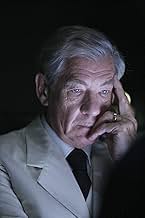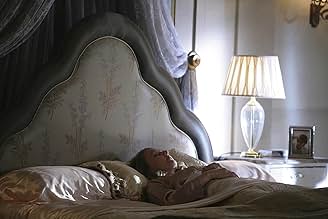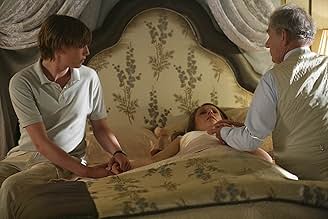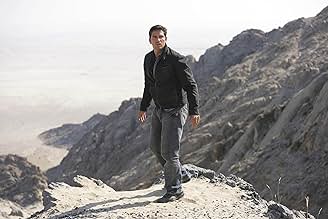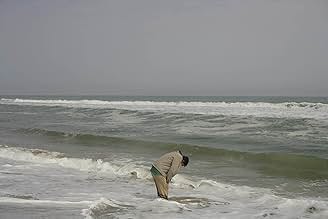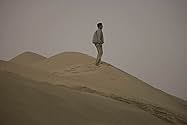The Prisoner
- Mini-série télévisée
- 2009
- 45min
Une mise à jour de la série culte et populaire des années 1960 sur un agent du gouvernement qui est enlevé et envoyé sur une île isolée appelée "The Village".Une mise à jour de la série culte et populaire des années 1960 sur un agent du gouvernement qui est enlevé et envoyé sur une île isolée appelée "The Village".Une mise à jour de la série culte et populaire des années 1960 sur un agent du gouvernement qui est enlevé et envoyé sur une île isolée appelée "The Village".
- Nommé pour 2 Primetime Emmys
- 10 nominations au total
Parcourir les épisodes
Avis à la une
A man resigns from a mysterious agency. Soon, he finds himself in a place known only as "the Village" where nobody has a name but is a number where he's re-dubbed Six by its leader a man known only as Two. Resisting Two's attempts to break his mind with his insistence "I am not a number, I am a free man," Six begins trying to escape while trying to piece together what and where the Village really is. That, in short, is the premise of the six episode miniseries re-imaging of the classic 1967 Patrick McGoohan TV series The Prisoner. The Prisoner is an intriguing psychological thriller with sci-fi overtones.
The miniseries is anchored by a fine cast. Jim Caviezal plays Six, a man lost in a strange world and always on his guard against everyone and everything around him, who is a radically different character from the McGoohan version. His foe is Sir Ian McKellen as Two, the Big Brother like leader who seems benevolent yet is in fact a manipulative and cunning man who brings to mind memories of Leo Mckern in the original series. The villagers include Two's son 11-12 (Jamie Campbell Bower), the beautiful but mysterious doctor 313 (Ruth Wilson) and 4-15 (Hayley Atwell) who has some connection to Six's old life. Together they bring to life the assorted characters who occupy the Village.
By definition, this is a re-imaging of the original series. The biggest change being the focus is on the mind games between Six and Two, making this more of a psychological thriller then the original perhaps was. These include introducing the concept of the Village being the only thing in existence which does stretch creditability quite a bit. More successful are mind games such as in Harmony when Six is told he has brother for example. More successful perhaps is the setting for these mind games is an intriguing new version of the Village set in the middle of the desert. Like in the original, it is here that the sci-fi overtones to come in. With them the series explores issues such as electronic surveillance, mind control and the ability of an individual to resist conforming with society allowing for some intriguing social commentary along the way. Also intriguing is the clever playing with flashbacks to Six's previous life which are not be what they seem. Having said all that, things can be a bit too surreal and downright confusing at times so if you don't have a open mind and don't pick up clues as the miniseries goes on, things can (and will) be baffling. Overall, the re-imaging works splendidly.
There's homages to the original series as well. These include such things as the old man's costume at the beginning of episode one (the role was originally meant as a cameo for the late Patrick McGoohan) and the return of the mysterious balloon like guard Rover. Perhaps the biggest homage lie in the various episode titles which are all derived from original series including Arrival and Checkmate to name just two. This helps to remind the audience that, though this is at times a radical re-imagining of the series, the past hasn't been completely forgotten about.
By blending fine acting, mind games, an intriguing setting, homages to the original series, and clever playing with story-lines and ideas this version of The Prisoner becomes, while not a classic, an intriguing psychological thriller with sci-fi overtones. Are you interested? Then prepare to take a classic TV series in an intriguing new direction. But remember: "You only think you're free."
The miniseries is anchored by a fine cast. Jim Caviezal plays Six, a man lost in a strange world and always on his guard against everyone and everything around him, who is a radically different character from the McGoohan version. His foe is Sir Ian McKellen as Two, the Big Brother like leader who seems benevolent yet is in fact a manipulative and cunning man who brings to mind memories of Leo Mckern in the original series. The villagers include Two's son 11-12 (Jamie Campbell Bower), the beautiful but mysterious doctor 313 (Ruth Wilson) and 4-15 (Hayley Atwell) who has some connection to Six's old life. Together they bring to life the assorted characters who occupy the Village.
By definition, this is a re-imaging of the original series. The biggest change being the focus is on the mind games between Six and Two, making this more of a psychological thriller then the original perhaps was. These include introducing the concept of the Village being the only thing in existence which does stretch creditability quite a bit. More successful are mind games such as in Harmony when Six is told he has brother for example. More successful perhaps is the setting for these mind games is an intriguing new version of the Village set in the middle of the desert. Like in the original, it is here that the sci-fi overtones to come in. With them the series explores issues such as electronic surveillance, mind control and the ability of an individual to resist conforming with society allowing for some intriguing social commentary along the way. Also intriguing is the clever playing with flashbacks to Six's previous life which are not be what they seem. Having said all that, things can be a bit too surreal and downright confusing at times so if you don't have a open mind and don't pick up clues as the miniseries goes on, things can (and will) be baffling. Overall, the re-imaging works splendidly.
There's homages to the original series as well. These include such things as the old man's costume at the beginning of episode one (the role was originally meant as a cameo for the late Patrick McGoohan) and the return of the mysterious balloon like guard Rover. Perhaps the biggest homage lie in the various episode titles which are all derived from original series including Arrival and Checkmate to name just two. This helps to remind the audience that, though this is at times a radical re-imagining of the series, the past hasn't been completely forgotten about.
By blending fine acting, mind games, an intriguing setting, homages to the original series, and clever playing with story-lines and ideas this version of The Prisoner becomes, while not a classic, an intriguing psychological thriller with sci-fi overtones. Are you interested? Then prepare to take a classic TV series in an intriguing new direction. But remember: "You only think you're free."
Would anyone really want to see a verbatim remake of a 1960s TV series? C'mon people, spies? It's not the cold war. Let the new series explore themes of paranoia, subversion, and identity in a new, interesting, and CURRENT context. At the same time it's adding new mystery. Part of the fun is figuring out what's going on. I wouldn't want a replica mystery and therefore be spoiled. I applaud the update, its creepy, technically sound, and confusing as hell. Granted, the acting is not top notch, Caviezel is doing the best he can but can't carry it, although McKellen and Ruth Wilson are great. Is it perfect? No. But does it deserve 1-2/10 just because it doesn't mimic its predecesor? C'mon people stop living in the past.
I have been an enthusiastic follower/student of the original "The Prisoner" since the premiere episode "Arrival" had its first USA showing in May 1968. Consequently, I was looking forward to this remake/update. Unfortunately, I was so disappointed that I changed the channel about five minutes into "Harmony." It was well acted, photographed, etc., but the problems were unsurmountable.
Right off, it starts with The Prisoner awakening, but not within The Village. He is instead in a desert, which proves to be not far removed from that community. We are never given any hint of a reason why--or even how--he comes to be there. Even Number Two, in the first interrogation scene, indicates that he does not know. It may be that the producers have disposed with the superficial level storyline, which even Patrick McGoohan considered unimportant, a necessity to get Lew Grade to agree to back the series. However, I feel that it is necessary to initiate audience involvement/sympathy. Here, "they" are trying to get our nameless hero to believe that The Village and environs is the entire world, no other population centers and indeed no other people. The only information sought from him concerns an old man he met in the desert, undoubtedly intended to be played by McGoohan; he even wears Patrick's Village costume. That is resolved in this opening episode.
This version of The Village, despite its name, looks like a small city, and not architecturally distinctive/surreal like "the grounds of the Hotel Portmeirion" (the location credit on the original show's finale), which was the initial inspiration. The residents wear normal clothing instead of distinctive Village costumes; although "Number Six" sports an outfit that would not have looked particularly out of place on a "Star Trek" set, it would not get a second look on a city street, either.
People unfamiliar with the original might not have the problems I had, but I can not guarantee that. For myself, I am done with this program.
Right off, it starts with The Prisoner awakening, but not within The Village. He is instead in a desert, which proves to be not far removed from that community. We are never given any hint of a reason why--or even how--he comes to be there. Even Number Two, in the first interrogation scene, indicates that he does not know. It may be that the producers have disposed with the superficial level storyline, which even Patrick McGoohan considered unimportant, a necessity to get Lew Grade to agree to back the series. However, I feel that it is necessary to initiate audience involvement/sympathy. Here, "they" are trying to get our nameless hero to believe that The Village and environs is the entire world, no other population centers and indeed no other people. The only information sought from him concerns an old man he met in the desert, undoubtedly intended to be played by McGoohan; he even wears Patrick's Village costume. That is resolved in this opening episode.
This version of The Village, despite its name, looks like a small city, and not architecturally distinctive/surreal like "the grounds of the Hotel Portmeirion" (the location credit on the original show's finale), which was the initial inspiration. The residents wear normal clothing instead of distinctive Village costumes; although "Number Six" sports an outfit that would not have looked particularly out of place on a "Star Trek" set, it would not get a second look on a city street, either.
People unfamiliar with the original might not have the problems I had, but I can not guarantee that. For myself, I am done with this program.
As a fan of the original Prisoner I can't begin to say how incredibly disappointed I am with this "remake". The "plot" is non-existent and makes no sense. It might be good if it had characters that made kept your interest in spite of the unintelligible plot line but sadly there isn't a single character that makes me care about what happens to them. In the original Patrick McGoohan was an excellent actor and portrayed an engaging character. The character of 6 in the original embodied the admirable quality of not giving up in spite of the odds. He was direct, smart and capable. In contrast, this 6 is a confused mamby-pamby guy with the personality of a doorstop. I am especially disappointed that one of my favorite actors, Ian McKellen would agree to appear in this mess. I think Patrick McGoohan is turning over in his grave.
Movie kept my interest. It separates from the original series in numerous ways. I would have preferred a closer match. That said, I thought the approach to this was still OK, and kudos to the actors who did a very nice job.
However, this remake failed with the ending of the movie. I won't spoil it. I believe the audience is left with just not believing the main character would act that way -- based on the story's own construction of the character. A story can take any twist, which is is fine, but if it makes a character act "out of character" one loses faith in the story. In this case, there is no justification for the ending based on what was seen. Unfortunate writing at the end.
However, this remake failed with the ending of the movie. I won't spoil it. I believe the audience is left with just not believing the main character would act that way -- based on the story's own construction of the character. A story can take any twist, which is is fine, but if it makes a character act "out of character" one loses faith in the story. In this case, there is no justification for the ending based on what was seen. Unfortunate writing at the end.
Le saviez-vous
- Anecdotes"Be seeing you" is a commonly-heard phrase in Le prisonnier (1967), this movie, and was also one of Patrick McGoohan's catchphrases in Destination danger (1960) and Destination danger (1964) . McGoohan's character "Johnny Cousin" (a pot-smoking drummer) in Tout au long de la nuit (1962) uses the phrase also when he says goodbye to the road manager "Berger" towards the end of the movie.
- ConnexionsFeatured in A Six Hour Film Shot in 92 Days: The Diary of 'The Prisoner' (2010)
Meilleurs choix
Connectez-vous pour évaluer et suivre la liste de favoris afin de recevoir des recommandations personnalisées
- How many seasons does The Prisoner have?Alimenté par Alexa
Détails
- Date de sortie
- Pays d’origine
- Site officiel
- Langue
- Aussi connu sous le nom de
- Ув'язнений
- Lieux de tournage
- Sociétés de production
- Voir plus de crédits d'entreprise sur IMDbPro
- Durée45 minutes
- Couleur
- Rapport de forme
- 1.78 : 1
Contribuer à cette page
Suggérer une modification ou ajouter du contenu manquant

Lacune principale
By what name was The Prisoner (2009) officially released in India in English?
Répondre


